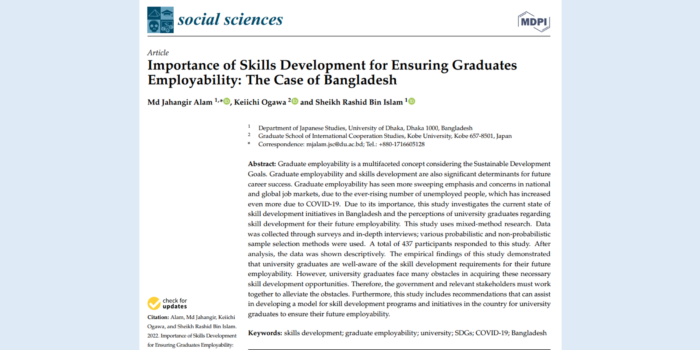Internship at FHI 360 (Lu JIAOLI)
The two-week internship at FHI360 in Washington, D.C. was short but fulfilling. As I look back on it, my mind is filled with uplifting memories. I made the right decision...
Graduate School of International Cooperation Studies (GSICS), Kobe University


Professor Keiichi Ogawa, University of Dhaka’s Associate Professor Alam (Ogawa seminar alumni) and Mr. Bin Islam published a joint paper in the Social Sciences. The paper is titled “Importance of Skills Development for Ensuring Graduates Employability: The Case of Bangladesh”.
By 2020, Bangladesh had a workforce of 70 million people, with the majority focused on the industrial sector, accounting for 79 percent of all employment. Around 40% of all employees are in the services sector, which is the most dominant one at the time and is predicted to grow even more in the years to come. COVID-19 pandemic has radically changed how the world views normalcy in just a few months, unlike any other decade in recent history. It already changed perceptions of companies and services globally, and it will continue to do so in the future.
In order to recommence its efforts toward greater efficacy, development, and sustainability, the world must reorganize itself to fit the post-COVID-19 status quo. As a result, the majority of well-known companies in Bangladesh would invest their resources in retraining their employees or hiring in accordance with the new customary requirements emphasizing 4IR. Bangladesh’s high unemployment rate was significantly impacted by the COVID-19 health issue. Additionally, it has been raised that university graduates lack the competencies and abilities necessary for employment in the post-COVID-19 era, and it is clear how important skill development is for achieving the SDGs.
The study looks into how skills development programs are currently being implemented in Bangladesh and how recent university graduates feel about the value of skill development to their employment. Surveys and in-depth interviews were utilized to gather data from 437 people. The empirical results of this study showed that graduates from universities are aware of the need to expand their skills set in order to be employable in the future. However, getting these crucial opportunities for skill development is difficult for recent graduates of universities.
Authored by Yousuf Daas (Master’s student)